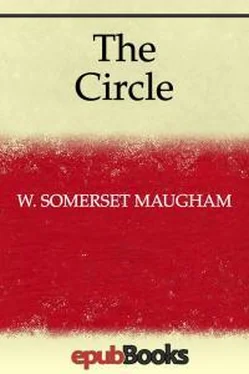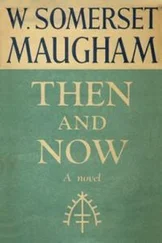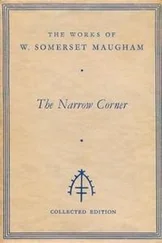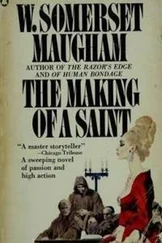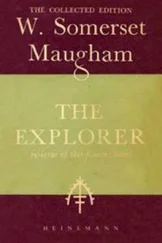The Circle
A Comedy in Three Acts
W. Somerset Maugham
The Scene is a stately drawing–room at Aston–Adey, with fine pictures on the walls and Georgian furniture. Aston–Adey has been described, with many illustrations, in Country Life. It is not a house, but a place. Its owner takes a great pride in it, and there is nothing in the room which is not of the period. Through the French windows at the back can be seen the beautiful gardens which are one of the features.
It is a fine summer morning.
ARNOLD comes in. He is a man of about thirty–five, tall and good–looking, fair, with a clean–cut, sensitive face. He has a look that is intellectual, but somewhat bloodless. He is very well dressed.
ARNOLD. [ Calling. ] Elizabeth! [ He goes to the window and calls again. ] Elizabeth! [ He rings the bell. While he is waiting he gives a look round the room. He slightly alters the position of one of the chairs. He takes an ornament from the chimney–piece and blows the dust from it. ]
[ A FOOTMAN comes in.
Oh, George! see if you can find Mrs. Cheney, and ask her if she'd be good enough to come here.
FOOTMAN. Very good, sir.
[ The FOOTMAN turns to go.
ARNOLD. Who is supposed to look after this room?
FOOTMAN. I don't know, sir.
ARNOLD. I wish when they dust they'd take care to replace the things exactly as they were before.
FOOTMAN. Yes, sir.
ARNOLD. [ Dismissing him. ] All right.
[ The FOOTMAN goes out. He goes again to the window and calls.
ARNOLD. Elizabeth! [ He sees MRS. SHENSTONE. ] Oh, Anna, do you know where Elizabeth is?
[ MRS. SHENSTONE comes in from the garden. She is a woman of forty, pleasant and of elegant appearance.
ANNA. Isn't she playing tennis?
ARNOLD. No, I've been down to the tennis court. Something very tiresome has happened.
ANNA. Oh?
ARNOLD. I wonder where the deuce she is.
ANNA. When do you expect Lord Porteous and Lady Kitty?
ARNOLD. They're motoring down in time for luncheon.
ANNA. Are you sure you want me to be here? It's not too late yet, you know. I can have my things packed and catch a train for somewhere or other.
ARNOLD. No, of course we want you. It'll make it so much easier if there are people here. It was exceedingly kind of you to come.
ANNA. Oh, nonsense!
ARNOLD. And I think it was a good thing to have Teddie Luton down.
ANNA. He is so breezy, isn't he?
ARNOLD. Yes, that's his great asset. I don't know that he's very intelligent, but, you know, there are occasions when you want a bull in a china shop. I sent one of the servants to find Elizabeth.
ANNA. I daresay she's putting on her shoes. She and Teddie were going to have a single.
ARNOLD. It can't take all this time to change one's shoes.
ANNA. [ With a smile. ] One can't change one's shoes without powdering one's nose, you know.
[ ELIZABETH comes in. She is a very pretty creature in the early twenties. She wears a light summer frock.
ARNOLD. My dear, I've been hunting for you everywhere. What have you been doing?
ELIZABETH. Nothing! I've been standing on my head.
ARNOLD. My father's here.
ELIZABETH. [ Startled. ] Where?
ARNOLD. At the cottage. He arrived last night.
ELIZABETH. Damn!
ARNOLD. [ Good–humouredly. ] I wish you wouldn't say that, Elizabeth.
ELIZABETH. If you're not going to say "Damn" when a thing's damnable, when are you going to say "Damn"?
ARNOLD. I should have thought you could say, "Oh, bother!" or something like that.
ELIZABETH. But that wouldn't express my sentiments. Besides, at that speech day when you were giving away the prizes you said there were no synonyms in the English language.
ANNA. [ Smiling. ] Oh, Elizabeth! it's very unfair to expect a politician to live in private up to the statements he makes in public.
ARNOLD. I'm always willing to stand by anything I've said. There are no synonyms in the English language.
ELIZABETH. In that case I shall be regretfully forced to continue to say "Damn" whenever I feel like it.
[ EDWARD LUTON shows himself at the window. He is an attractive youth in flannels.
TEDDIE. I say, what about this tennis?
ELIZABETH. Come in. We're having a scene.
TEDDIE. [ Entering. ] How splendid! What about?
ELIZABETH. The English language.
TEDDIE. Don't tell me you've been splitting your infinitives.
ARNOLD. [ With the shadow of a frown. ] I wish you'd be serious, Elizabeth. The situation is none too pleasant.
ANNA. I think Teddie and I had better make ourselves scarce.
ELIZABETH. Nonsense! You're both in it. If there's going to be any unpleasantness we want your moral support. That's why we asked you to come.
TEDDIE. And I thought I'd been asked for my blue eyes.
ELIZABETH. Vain beast! And they happen to be brown.
TEDDIE. Is anything up?
ELIZABETH. Arnold's father arrived last night.
TEDDIE. Did he, by Jove! I thought he was in Paris.
ARNOLD. So did we all. He told me he'd be there for the next month.
ANNA. Have you seen him?
ARNOLD. No! he rang me up. It's a mercy he had a telephone put in the cottage. It would have been a pretty kettle of fish if he'd just walked in.
ELIZABETH. Did you tell him Lady Catherine was coming?
ARNOLD. Of course not. I was flabbergasted to know he was here. And then I thought we'd better talk it over first.
ELIZABETH. Is he coming along here?
ARNOLD. Yes. He suggested it, and I couldn't think of any excuse to prevent him.
TEDDIE. Couldn't you put the other people off?
ARNOLD. They're coming by car. They may be here any minute. It's too late to do that.
ELIZABETH. Besides, it would be beastly.
ARNOLD. I knew it was silly to have them here. Elizabeth insisted.
ELIZABETH. After all, she is your mother, Arnold.
ARNOLD. That meant precious little to her when she—went away. You can't imagine it means very much to me now.
ELIZABETH. It's thirty years ago. It seems so absurd to bear malice after all that time.
ARNOLD. I don't bear malice, but the fact remains that she did me the most irreparable harm. I can find no excuse for her.
ELIZABETH. Have you ever tried to?
ARNOLD. My dear Elizabeth, it's no good going over all that again. The facts are lamentably simple. She had a husband who adored her, a wonderful position, all the money she could want, and a child of five. And she ran away with a married man.
ELIZABETH. Lady Porteous is not a very attractive woman, Arnold. [ To ANNA. ] Do you know her?
ANNA. [ Smiling. ] "Forbidding" is the word, I think.
ARNOLD. If you're going to make little jokes about it, I have nothing more to say.
ANNA. I'm sorry, Arnold.
ELIZABETH. Perhaps your mother couldn't help herself—if she was in love?
ARNOLD. And had no sense of honour, duty, or decency? Oh, yes, under those circumstances you can explain a great deal.
ELIZABETH. That's not a very pretty way to speak of your mother.
ARNOLD. I can't look on her as my mother.
ELIZABETH. What you can't get over is that she didn't think of you. Some of us are more mother and some of us more woman. It gives me a little thrill when I think that she loved that man so much. She sacrificed her name, her position, and her child to him.
ARNOLD. You really can't expect the said child to have any great affection for the mother who treated him like that.
ELIZABETH. No, I don't think I do. But I think it's a pity after all these years that you shouldn't be friends.
Читать дальше
